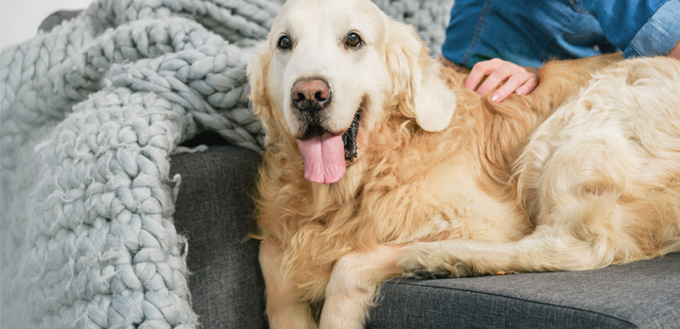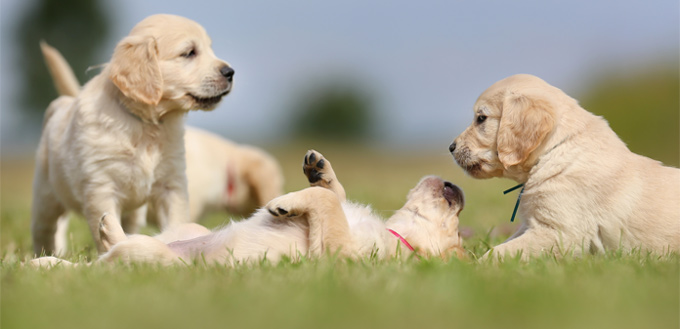Author Dean Koontz once said that Golden Retrievers inherently think that they, too, are human. And every human being that Goldens meet is believed to have the potential to be an excellent companion who might, at any time, cry. This speaks a lot about the character of a Golden retriever.
Despite their size, Goldens were never intended to be guard dogs. Their irrepressible joy in life, unquenchable thirst for human companionship, and the generosity of their hearts are forever etched in the memories of thousands of individuals longing for the same. They’re found in hospitals, hospices, nursing homes, and even disaster zones where their loving and affectionate nature can bring comfort and solace to those whose hearts are bleeding and whose souls are lost.

The story of the Golden retriever is one of remarkable endurance, not in the physical terms, but in its unquestionable loyalty to its human companion. They will not bite, though they will bark. Show them your heart and they’d be more than willing to return it many-times-fold. Their soulful eyes long for that human connection, a fact that has been immortalized in many films as well as real-life stories. From Shadow to Murphy to Sandy and the many other Goldens who have, in one way or another, epitomized what “man’s best friend” really means, Golden Retrievers have truly captured both the hearts and imagination of modern man.
Sturdy and muscular, the Golden retriever is one who never backs down from a challenge. Its broad head complete with a very friendly and highly intelligent pair of eyes, a straight muzzle, and relatively short ears have become a hallmark for the breed. They’ve got a powerful, albeit smooth gait. Their feathery tail always dances in the wind, a trait that fans of the breed say is an indication of a gleeful action.
Goldens require a monthly bath, at the very least. But if you want it to look and smell clean, then you’d have to bathe it more frequently. Brushing its teeth is required at least every other day; preferably daily. Its nails need to be trimmed at least once a month. Its ears should also be checked weekly for signs of possible ear infections as they are especially prone to such health problems.
Health Issues
Golden retrievers share some common disorders with other medium- to large-sized dog breeds. For example, they are known to be especially prone to the development of hip dysplasia, a genetic condition wherein the thighbone simply isn’t fitting properly into the hip joint. This can lead to a host of problems related to its mobility. They are also known to develop elbow dysplasia.
Goldens are also vulnerable to a host of eye problems such as cataracts and progressive retinal atrophy. Both conditions can lead to a complete or partial loss of vision for the dog. They are also susceptible to subvalvular aortic stenosis, a kind of fatal heart problem that stems from a very narrow connection between the aorta and the left ventricle of the heart. In severe forms, death can ensue because of cardiac failure.
This breed of dog is also known for allergies, whether it is from pollen or food. Young Golden retrievers are vulnerable to the development of osteochondrosis dissecans whereby the cartilage tissues in the joints do not grow properly. Other health problems that Golden retrievers are known for include Von Willebrand’s disease, epilepsy, hemangiosarcoma, osteosarcoma, hypothyroidism, and bloat with resulting gastric torsion.
You’ll know if the Golden Retriever is right for you if you love a dog that:
- Is very easy to train
- Is very smart
- Is devoted and committed to its family
- Has an enviable positive outlook in life
- Is dead serious at work yet comic during playtime
- Is kid- and other-pet-friendly
- Is loyal, obedient, and faithful
- Is very eager to please
- The Golden Retriever is definitely not for you if you:
- Don’t like spending a minimum of 30 minutes of vigorous exercises twice daily for the rest of its life
- Don’t like picking and cleaning up hairs from your furniture, carpet, and even clothing
- Don’t like a dog that instantly becomes friendly to strangers
- Don’t like grooming a dog on a daily or at least weekly basis
- Intend to leave your dog for more than 7 hours at a time
Related Post: Best Vacuum for Dog Hair
History
There is this legend that says the Golden retriever is actually a descendant from the sheepdogs that roamed Russian grasslands. As legends go, there is not one bit of truth to it. Instead, Golden retrievers were bred by Sir Dudley Marjoribanks who was later called Lord Tweedmouth. Like the other members of the nobility in 19th century Scotland, Lord Tweedmouth strived to breed the perfect dog – a highly talented retriever complete with a nose that is incomparable. Lord Tweedmouth also longed for a retriever that is more attentive to its human master and hunting companion than spaniels and setters that were commonly used for game retrieval at the time. Lord Tweedmouth also desired a retriever with unquestionable loyalty and an even temperament especially in the home.
In 1868, Lord Tweedmouth bred a wavy-coated retriever named Nous with Belle, a Tweed water spaniel. This produced the very first Golden retrievers in history – Crocus, Primrose, and Cowslip, three bouncy yellow wavy-coated Goldens. The gentleness, loyalty, and calmness of the Golden retriever especially in the home are attributed to the innate qualities of the now-extinct Tweed water spaniels. Their hunting skills were also unmatched at the time.

The direct descendants of Nous and Belle were bred with a red setter, a Tweed water spaniel, and flat- and wavy-coated retrievers to provide the foundation for today’s many types of Golden retrievers.
One of the most celebrated Goldens of all time was the liver-coated Golden named Don of Gerwyn. This Tweedmouth dog descendant won the 1904 International Gundog League Trial. Seven years later, the breed drew official recognition from the Kennel Club of England. They were still called Yellow or Golden Retriever at the time. It was only in 1920 when the breed was officially called the Golden Retriever. Twelve years after, the Golden was officially recognized by the American Kennel Club where it remains the country’s number 3 top dog as of 2017.
As Dean Koontz once said, human companions of Golden Retrievers should be more than prepared to lead their dogs on a great adventure. If you’re not ready for such an adventure, then a Golden might not be for you. But if you want absolute joy in your life, a dog that can bring a smile into your face every time it looks at you, then a Golden retriever fits the bill perfectly.
You may also wish to read our review of the best dog food for Golden Retrievers.
Sources:
- Jan Reisen, 10 Things To Know About Golden Retrievers, The American Kennel Club





